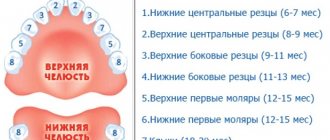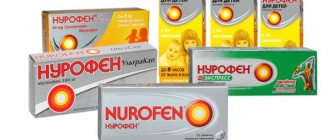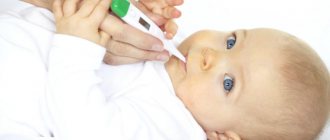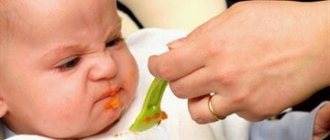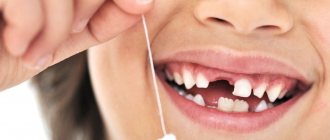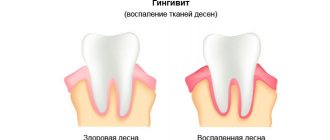Komarovsky about teething
Basic principles of teething according to Komarovsky
The next thing Komarovsky reminds us of is that all children will sooner or later have teeth! How many toothless school graduates have you seen? Therefore, you should not attribute the slightest hysterics and bowel disorders to your teeth. Fever, runny nose, diarrhea and snot in children can appear from a simple infection that was brought in by neighbor Uncle Vasya when he went to buy salt. During the period of 6-7 months (just the time when all mothers eagerly begin to look for and wait for the baby’s first teeth), the baby begins to form its own immunity, as the antibodies to various ailments obtained from breast milk run out.
Each child is individual, so he may not have standard symptoms at all (diarrhea, fever, snot, runny nose).
Komarovsky advises examining the child’s oral cavity as little as possible: you can inadvertently introduce an infection.
Symptoms of the first teeth according to Komarovsky
- The baby's gums are swollen and he cries when touched;
- A white bump is noticeable on the gum - this is a new tooth;
- A runny nose with the discharge of a small amount of clear snot is a standard situation. However, if the child’s snot has acquired a yellowish or greenish tint, an infection is to blame;
- A child's low-grade body temperature lasts for a day or more (37-37.3). Sometimes the temperature rises to high levels, in these cases it is necessary to call a pediatrician at home to examine the child;
- Diarrhea during the period of growth of the first teeth is a normal phenomenon associated with excessive salivation and a change in the baby’s diet (vegetables and fruits appear, the child may refuse certain types of food due to poor health).
Attention! Komarovsky warns that if your baby has a high fever with watery, foul-smelling diarrhea and a runny nose, call a doctor!
How to help a child
- Give your baby a special baby teether or a rubber ring with cooled liquid: they will safely and effectively relieve pain and itching of the gums. Also, some parents give their kids carrots, apples and bagels, but Komarovsky warns that this is dangerous for the children’s lives: a child can simply choke;
- Give your child time: if you distract your baby, the process of the appearance of the first teeth may go unnoticed;
- You can massage your child's gums with your finger - this can relieve the discomfort associated with teething. Hands should be perfectly clean, with short-cut, cleaned nails;
- Contact your pediatrician - and he will prescribe medicine for your baby to relieve pain, reduce fever and get rid of diarrhea and runny nose, and tell you when and how much to give it. Without consulting a specialist, you should not give any medications to a baby for a runny nose or diarrhea. All drugs have age restrictions!
To reduce the temperature, children can be given Nurofen (the drug also has an analgesic effect), Panadol or Paracetamol in the form of syrups, as well as glycerin suppositories for rectal use.
For diarrhea, Smecta, a rice broth, is recommended.
A runny nose in infants is treated with Nazivin and Aquamaris.
Panadol and some topical preparations (ointments for gums) containing an anesthetic are used for pain relief.
The main rules for the appearance of baby teeth according to Komarovsky
- No matter how many months your baby is, by the age of three he is guaranteed to have grown all his baby teeth;
- An incorrect sequence of teeth appearance (“not according to the book”) is an absolutely normal phenomenon and you should not drag your child to the dentist;
- Teeth may well come out six months earlier or later: this is individual for all babies, but dentists consider the average age for the appearance of the first tooth to be 7.5 months;
- It is impossible to influence the growth rate, sequence of appearance or quality of teeth with medications.
- The order of teething in a child
- What to smear on baby's gums when teething
- How many days does it take for a baby to erupt his first teeth?
- When do children cut teeth?
- A child grinds his teeth in his sleep - reasons according to Komarovsky
Attention! All information presented on the site is intended for informational purposes only and cannot be considered as a guide to action. Be sure to consult with a qualified specialist so as not to harm your health!
Copying of materials is permitted only with indication
How to help a child?
If you want to know how to help your baby teething, Komarovsky offers the following methods:
- A special teether, which is a rubber ring with liquid inside, must first be cooled and allowed to be chewed by the baby. This will help the incisors and molars appear faster, and the cooling will dull the pain and itching.
- Solid foods - bagels, apples, carrots should be given with caution; the baby may choke on a piece of food.
- Keep your child busy - games, songs and nursery rhymes are a good way to make teething easier according to Komarovsky.
- Unpleasant sensations can be reduced with massage. Gently massage your baby's gums with clean hands and short-cut nails to avoid any infection.
- It is better not to give any medications without consulting a doctor - only a pediatrician can prescribe suitable medications for your baby for diarrhea, pain, fever and runny nose. Many drugs have age restrictions, and the dosage depends on the child’s weight.
For fever in infants, it is recommended to use medications such as Nurofen, Paracetamol or Panadol. All of these medications will also help reduce pain. You can also use special gels and ointments to reduce itching and pain.
Komarovsky about teething
Features of teething
The timing of teething depends on various individual characteristics. So, one child’s first teeth appear at 3 months, while another’s teeth appear closer to a year. In some cases, a young mother notices the first tooth only during feeding.
When is there no reason to worry?
During the appearance of the first teeth, the baby’s behavior, as well as the reaction of the small organism, may change. The main symptoms are:
Alarming symptoms
Most parents are sure that diarrhea always accompanies teething. Some doctors agree. So, a large amount of saliva that a child swallows can lead to disorder. However, other experts do not share this point of view, so it is best to consult a doctor if your baby has loose stools.
Cold or first teeth
What should parents remember?
- When teething, the baby's sleep is disrupted. If your baby begins to cry at night and fidget restlessly in the crib, you need to let her calm down on her own. There is no need to rock your baby to sleep or feed him milk right away.
- In some cases, a hematoma, that is, small bumps, forms on the gums. They dissolve on their own. If anxiety is severe, you can use a cold compress.
- Severe pain often spreads to the child’s ears and chin. Most often this happens when the incisors begin to appear. However, children may rub their chin and face when they have an ear infection. Therefore, it is necessary to consult a doctor.
- When teething, a cough may occur, because the child does not always have time to swallow saliva. If there are no other symptoms, then there is no need to worry. This also applies to a runny nose caused by saliva entering the nasopharynx. If you have other alarming symptoms, you should consult your pediatrician.
Komarovsky about teething
Parents should know that the period of teething varies within 6 months. In this case, teeth often appear in different sequences depending on individual characteristics. It is enough to remember these two points to be prepared for anything.
Sleep and teething - what to do?
All parents know that teething is one of the most unpleasant events that can happen to their baby.
Children become capricious, sleep poorly and put everything in their mouth. But parents often confuse poor sleep and the vagaries associated with it with teething. How to understand that your baby is teething and how to maintain good sleep? Some sleep experts write in their books that teething does not harm sleep if the baby has already formed the right habits. But I can't agree with this.
As with everything else, all children are different, and their pain sensitivity threshold is different.
So I think it's our responsibility as parents to sympathize and try to help kids get through this difficult period, but at the same time make sure they get enough sleep.
What are the signs that your baby is teething?
- excessive salivation;
- runny nose;
- redness of the cheeks and/or rash on the chin, around the mouth;
- refusal of the breast/bottle or, conversely, the desire to breastfeed more often;
- strengthening of the sucking reflex;
- desire to bite/gnaw everything around;
- swollen, whitish gums;
- difficulty falling asleep and staying asleep;
- capriciousness, tearfulness.
Also, sometimes when teething, the temperature may rise, stool and frequency of urination may change. But if these symptoms occur, you need to be more careful, as they may indicate an infection. Therefore, if you have any suspicions, it is better to consult a doctor.
How to distinguish teething from just bad sleep?
In fact, this is a very difficult question. My baby, for example, never had swollen gums, fever or runny nose, and the desire to put everything in his mouth did not depend on teething.
I usually discovered new teeth by accident. That is, just yesterday evening the gum looked as usual, but today a tooth is sticking out of it.
How can you differentiate poor sleep due to teething from other causes of poor sleep? Here are the main points that parents need to remember:
1) The baby slept well, but now he sleeps very poorly. If you have ruled out all possible reasons for waking up and the baby is not sick, then it may be that his teeth have begun to bother him. If this is the case, look closely and you may be able to spot one or more of the symptoms listed above.
2) The baby feels unwell throughout the day. The discomfort from teething should not be confused with the evening whims that arise due to insufficient sleep during the day or going to bed late at night. Indeed, the baby may be more restless at night. But if he behaves very well during the day, and often wakes up at night, then the cause may not only be his teeth.
3) If you have ruled out all other causes of your baby’s anxiety, then you can give him a painkiller 15-20 minutes before bedtime (for example, Nurofen - 2.5 ml once), having previously discussed this with your pediatrician. If the baby is really worried about his teeth, then he will fall asleep better and will not wake up for at least 4 hours, or even all 5-6 (if at night), and during the day he will have a full sleep lasting 1.5-2 hours.
How long does teething take?
It can take 2 years from the first to the last tooth. But this does not mean that the baby will sleep poorly for the entire 2 years “because of teeth.” Very often, parents attribute poor sleep to teething.
But in reality, teething itself lasts 2-5 days (molar teeth take longer to erupt).
The rest of the poor sleep time is the result of bad habits that we, parents, unknowingly create.
How to help your baby?
Even though it is very difficult to relieve a baby's distress, we still need to make every effort to help him fall asleep and get enough sleep throughout the day and night.
Throughout the day, various teethers (pre-chilled in the refrigerator), a pacifier, special massage brushes, additional drinking of cool water, and additional breastfeeding can help. Teethers helped my baby, but I know many mothers who said that it didn’t help them at all. Try to experiment, and perhaps you will find something that suits your baby.
Nonsteroidal anti-inflammatory drugs (ibuprofen or paracetamol) are considered the most effective medications. Children's ibuprofen (=nurofen) is considered the gold standard, but some experts do not recommend it before 6 months. Therefore, before giving your baby one of these drugs, consult your pediatrician .
Freezing gels can also help. But they must be used very carefully, as they can have a fairly strong “freezing” effect, which can greatly frighten the child and he may become even more restless.
Note! According to the latest data, it is not recommended to use pain-relieving gels that contain benzocaine (for example, Orajel), as they can be dangerous to your baby's health.
(More about this here.)
Separately, I would like to say about homeopathic medicines. As is known, their effectiveness has not been proven. But the harm has also not been proven. Although mothers claim that their baby “helped a lot.”
Should I stop sleep training during teething?
There can be no clear answer here. If the baby is very unwell, his temperature has risen and he refuses to eat, you should pay him even more attention, take him in your arms, hug him, stay with him longer, even if this affects his sleep.
But if the baby is simply “gnawing on his fists,” then you should not deviate from the planned plan. As I already wrote above, teeth erupt over the course of 2 years, but this does not mean that you need to suffer all these 2 years and wait for them to all erupt.
Natalya Domres, children's sleep consultant, neurologist and author of the Baby's Sleep project
Dear Parents! I sincerely wish your babies healthy teeth and good sleep. If you need help, you can always contact me for a consultation, and together we will help you and your baby get enough sleep!
Do you want to keep abreast of new articles and events of the Baby's Dream project? Sign up for the newsletter on the right side of the page!
Source: https://baby-sleep.pro/son-i-prorezyivanie-zubov-kak-byit/
Komarovsky about teething
Features of teething
The timing of teething depends on various individual characteristics. So, one child’s first teeth appear at 3 months, while another’s teeth appear closer to a year. In some cases, a young mother notices the first tooth only during feeding.
When is there no reason to worry?
During the appearance of the first teeth, the baby’s behavior, as well as the reaction of the small organism, may change. The main symptoms are:
Alarming symptoms
Most parents are sure that diarrhea always accompanies teething. Some doctors agree. So, a large amount of saliva that a child swallows can lead to disorder. However, other experts do not share this point of view, so it is best to consult a doctor if your baby has loose stools.
Cold or first teeth
What should parents remember?
- When teething, the baby's sleep is disrupted. If your baby begins to cry at night and fidget restlessly in the crib, you need to let her calm down on her own. There is no need to rock your baby to sleep or feed him milk right away.
- In some cases, a hematoma, that is, small bumps, forms on the gums. They dissolve on their own. If anxiety is severe, you can use a cold compress.
- Severe pain often spreads to the child’s ears and chin. Most often this happens when the incisors begin to appear. However, children may rub their chin and face when they have an ear infection. Therefore, it is necessary to consult a doctor.
- When teething, a cough may occur, because the child does not always have time to swallow saliva. If there are no other symptoms, then there is no need to worry. This also applies to a runny nose caused by saliva entering the nasopharynx. If you have other alarming symptoms, you should consult your pediatrician.
Komarovsky about teething
Parents should know that the period of teething varies within 6 months. In this case, teeth often appear in different sequences depending on individual characteristics. It is enough to remember these two points to be prepared for anything.
How to make teething easier for babies Komarovsky.
According to Komarovsky, parents sometimes go too far when it comes to caring and worrying about the health of their child. Teething is a common occurrence that should not be feared. And yet, parents continue to panic and torment themselves with questions: what to do when teeth are being cut, how to relieve pain - Komarovsky believes that everything should happen naturally, without the use of painkillers and especially potent drugs.
How to numb your gums if you are teething - Komarovsky offers proven methods: a teether with a cooling solution inside and ordinary rubber toys intended for children from the first days of life. By putting such objects into the mouth, the child massages the gums and numbs them. Komarovsky is confident that this will be enough to make the teething process quick and as painless as possible.
But if teething is too difficult, how to relieve pain according to Komarovsky’s advice? The pediatrician believes that if there is a slight increase in temperature, it is not worth taking antipyretic drugs. Although the same children's "Nurofen" has a double effect: it relieves pain and helps reduce fever. It can be used almost from the first days of a baby’s life, but you should pay attention to the composition of the drug. Dyes and flavors can cause allergic reactions, aggravating the condition of the little patient.
Why do babies’ teeth “come” with fever?
Dentation is not always accompanied by an increase in temperature. The child’s body is not perfect; the baby’s organs and systems are not fully developed. Therefore, the answer to any process occurring in the body may be different.
The reason for the increase in temperature on the teeth
What happens during teething? The baby becomes capricious and sleep is disturbed. The child may refuse to eat altogether. All these phenomena significantly reduce the body’s defense mechanisms, so the child becomes more susceptible to infection. Infection is usually the cause of fever.
But there are also situations when the baby has a fever for no apparent reason. Why does it occur? The fact is that in this situation, an increase in temperature appears in response to a local inflammatory process in the oral cavity. What do we see in a child's mouth when teething? You can observe swelling of the gums and redness at the site of the future tooth. The body reacts to such changes in different ways.
Other Possible Teething Symptoms in Babies
As a rule, the temperature rises slightly. Along with it, the child develops profuse salivation. The enzyme composition of saliva may change at the time of teething, so this fact leads to stool disturbances. But diarrhea, as a rule, is not frequent and feces are without pathological impurities.
As mentioned earlier, the child’s general condition deteriorates sharply. He becomes moody, irritable, refuses to eat, and often wakes up at night. While awake, attentive parents often notice that the baby is pulling objects into his mouth, thereby trying to scratch painful gums. Sometimes at this time she cries because pain appears.
Also, many note that babies do not react as violently to the upper and lower first incisors, unlike the canines. This fact can also be explained. The roots of the upper and lower front incisors are much shorter than those of the others, and the area of gum inflammation during eruption is smaller.
Komarovsky on how to relieve pain for teething
Komarovsky believes that when teeth are being cut, you shouldn’t wonder too often how to relieve the pain from the process. Massaging the gums with hard vegetables, as many experts advise, is undesirable, because a child can bite off a piece of the same apple or carrot and inhale it. The same can be said about cookies. This product should not be given to children until they begin to eat on their own.
Cooling gels can be used, but in limited quantities. According to Komarovsky, herbal formulations offered by pharmacists as safer are less effective and highly allergenic. It is almost impossible to get rid of pain by using herbal gum composition. Parents only reassure themselves that they helped their child by smearing his gums with a “magic” composition. The pain goes away on its own when teeth erupt. None of the existing drugs can affect the speed and timing of eruption.
Komarovsky also advises not to pay attention to teeth grinding during the period of teething. In this way, the child scratches his inflamed gums and tries to numb them. As soon as the teeth erupt, the creaking at night will stop.
How to make teething easier for babies?
Every day children grow and develop. Various processes take place in their bodies, which only confirm the fact that children are growing up. Upon reaching six months of age, infants begin to erupt their first teeth, which can cause them discomfort and even pain. What to do in this situation and how to help your baby?
Some parents learn that their children have their first teeth by the characteristic sound that is observed as a result of biting a hard object. Most mothers who breastfeed their babies learn this after biting on the breast during feeding. One can envy such parents, because they did not have to face all the delights of teething.
You won’t envy the parents who felt every new tooth of their baby. Among the symptoms they encountered were:
- Child's moodiness and tearfulness. As a result of teething, children are quite sensitive to changes that cause them discomfort and pain.
- Increased body temperature.
- There may be excessive production of saliva, which can cause discomfort to the baby due to the appearance of irritation on the chin. As a result of excessive saliva production, frequent bowel movements may occur.
- During the teething period, infants are characterized by a lack of appetite and sleep.
Dr. Komarovsky urges parents not to make a tragedy out of the fact that the child’s teething process has begun, because it is inevitable and completely natural. Komarovsky also believes that at this time parents should pay more attention to the child and direct their efforts to facilitate the process of teething in children.
Medicines
Naturally, every mother, watching the suffering of her children, especially if toothache causes them discomfort, tries to somehow help and alleviate this condition. To do this, she goes to the pharmacy in search of a magic remedy that will relieve pain and leave no trace of it. Such medications may include special gels to relieve teething pain:
- Kalgel;
- Dentinox;
- Kamistad;
- Dentol baby;
- Holisal;
- Baby Doctor;
- Pensoral first teeth.
But, before you buy, let alone use, any product on a child, you need to listen to what experts, for example, Dr. Komarovsky, think about this.
Dr. Komarovsky, like most pediatricians, believes that parents should help their child during this difficult period for him and do everything possible to facilitate this process, especially since there are many ways to do this:
- To begin with, you can use special rubber rings. The material from which they are made is safe for children. There is usually liquid inside rubber rings. Some time before giving the ring to your child, it should be cooled in the refrigerator. This way the low temperature can dull the pain and alleviate the child’s suffering. You can buy a ring at a pharmacy.
- Among pharmaceutical preparations you can find various means to eliminate the symptoms of teething in infants. For example, you can use a special ointment that relieves pain due to the content of lidocaine. This product is applied to the child’s gum and numbs it. Among pharmaceutical drugs, there are also various drugs that have a complex effect. As a rule, they relieve pain, irritability, and stabilize the baby’s body temperature.
Folk remedies
Not all parents accept pharmaceutical drugs, and they try to help the child using folk remedies. And Dr. Komarovsky himself insists that it is necessary to resort to pharmaceutical drugs only after traditional methods have been used to relieve the pain of teething in the baby. Therefore, you can take into account traditional methods that have been approved by most specialists, including Dr. Komarovsky:
- In order to relieve inflammation from the gums and thereby reduce pain, you can use a decoction of chamomile or sage. It is necessary to rinse the baby’s mouth with this decoction several times a day.
- If the child is already eating solid food during the teething period, then you can replace the rubber ring with vegetables or fruits. An apple, cucumber, or banana are suitable for this. But when resorting to this method, it is necessary to ensure that a piece of solid food does not get into the child’s respiratory tract and that he does not choke on it.
- Some children like it when their mother runs her finger along the gum. In order to minimize pain, you can wet your finger with cool water from time to time, which will soothe the inflamed gum.
- Dr. Komarovsky recommends giving the child maximum attention during the teething period. This will allow him to take his mind off the painful sensations caused by the appearance of his first teeth. To do this, parents need to keep their child busy with interesting games, communicate with him, and give him a massage.
- Cool compresses on the gums can somewhat replace a rubber band or teether.
- It is worth increasing the time your child spends outdoors if the weather allows it. Fresh air is a panacea for many diseases, so a baby who is outside will feel much better. He will be distracted from what makes him uncomfortable. In addition, fresh air helps improve appetite and normalize sleep, which is important during the period when a child’s first teeth appear.
